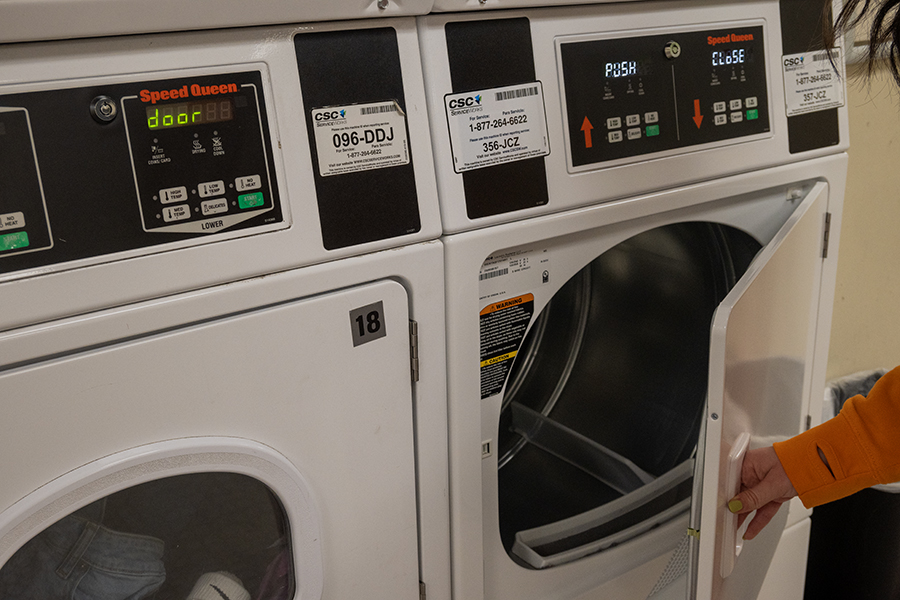As some Ithaca College students share concerns about laundry machines in residence halls breaking down for several days, the Office of Residential Life is working to decrease disruptions to laundry services.
The college leases the laundry machines from CSC Service Works, which is the largest commercial laundry services provider in the United States, Europe and Canada. According to the CSC Service Works website, more than 1,300 colleges and universities use the laundry services provider.
Since the start of Spring 2024, clothes caught on fire in a dryer in Holmes Hall, clothes overheated in a Bogart Hall dryer and a washing machine in Terrace 3 started smoking.
Sophomore Anna Capodilupo said she lives in Terrace 3 and was alarmed when she returned to her residence hall March 19 and saw fire trucks and officers from the Office of Environmental Health and Safety responding to the smoking washing machine.
Capodilupo said she thinks about the smoking washer every time she uses the laundry machines.
“I’m just really cautious now when I do my laundry, and I have to do it in smaller loads,” Capodilupo said. “I’m using a lot more of my detergent and Tide Pods, and that’s kind of inconvenient. … One Tide pod can do a lot of laundry and I feel like I’m just wasting it.”
Capodilupo said that dividing her laundry into smaller loads is also challenging because her Terrace has two working washers for 50 residents, which makes laundry very competitive.
Laundry service provider
Senior Violet Van Buren has been a resident assistant in Terrace 12 since Fall 2021. She said her building has consistently struggled with laundry machines that do not work. Van Buren said her building gained an additional washer after spring break, which has helped because the original washers have been inconsistently usable.
“Right now we’ve got two washers that work,” Van Buren said. “One of them is just sort of off to the side for some reason. … It worked for the first month and now has not been fixed since and they moved it so that we can’t use it.”
Jenny Pickett, assistant director of Residential Life and Student Conduct and Community Standards, said the laundry machines are breaking down frequently because they are reaching the end of their lives. She said the college will not receive new machines until it starts a new contract with a laundry service provider.
Pickett said the college’s seven-year contract with CSC ended in May 2023. Pickett said that in discussions for a new contract, CSC planned to raise the price of each machine by $10 monthly — which would have increased the college’s cost of laundry services for its then-total of 308 machines by $36,960 per year.
Pickett said that as the college works with a deficit resulting from decreased enrollment, Res Life could not increase its budget to cover the cost of CSC’s proposed new contract and would have had to make significant cuts. She said Res Life and CSC agreed to a two-year contract extension with the monthly price of each machine increasing by $3.
Pickett said her office hopes that as the college’s smallest class graduates in Spring 2024, enrollment will increase and Res Life’s budget will increase, which will allow Res Life to enter a new contract and get new laundry machines by the end of the two-year contract extension in June 2025.
Pickett said the slow service response time and increasing cost have encouraged Res Life to look for a different laundry service provider. She said Res Life asked for new pricing from CSC and started a request for proposal process — contacting alternative companies with information about the campus size, number of machines and number of dorms and asking for a price quote — during Spring 2024.
Within the last year, Dartmouth College ended its relationship with CSC, Yale University announced its plan to terminate its contract with CSC and students at Case Western Reserve University and Boston College shared their frustrations with the service.
CSC did not respond to interview requests.
Machine Availability
Pickett said she recognizes that some residence halls’ laundry facilities are stressed by having too many students in proportion to machines. Pickett said the college tries to follow the higher education industry standard to have one washer and dryer for every 22-24 students in a residence hall.
“Some of our buildings are there and some are not,” Pickett said. “Both Towers … it’s more a high rise, so there’s 10 of each [machine] in this building. So while it’s not exactly one to 22, I think they feel the pain less than in a quad or a terrace where there’s just less machines total. And so in a Terrace … when you have two washers and two dryers and you have 50 people, I mean, technically we’re hitting real close to that [ratio]. But it goes real quick from OK to not OK if one of those machines goes down.”
Pickett said that during spring break, Res Life brought 50 new washing machines to campus. Pickett said via email that ResLife put an additional washer in the larger terraces — Terrace 3, 6, 7, 8, 9 and 11 — for a total of three washing machines in these buildings. The other new machines replaced old machines, mostly in the Terraces and Quads, that had received the most work orders.
“The ratio of machines to students was the smallest in the Terraces,” Pickett said. “We worked to replace the front loaders with top loaders — which were cheaper — so that in the larger [Terrace] buildings, we could go from two washers to three washers, which would help ease the burden of usage because they would be used less each.”
Pickett said ResLife paid for the new washers by accepting the smaller price increase through the CSC contract extension and diverting funding originally intended for replacing lounge furniture.
Pickett said most of the laundry machines on campus are front-loading, meaning that the door is on the front of the machine, but the new machines are top-loading. Pickett said Res Life realized that students are having difficulty using the new types of machines and need more education.
“In that first week, we had three machines overloaded that burned out the belts, and in one case [in Terrace 3], a fire extinguisher was used because the belt was burning,” Pickett said. “There was two full loads worth of clothes crammed in that. … I think what we learned was probably most college-age students had never used top loaders. Front loaders are much more prevalent now.”
Repair times
Pickett said that before the start of the COVID-19 pandemic, one technician serviced the college, Cornell University and SUNY Cortland’s laundry machines. CSC added Elmira College and Mansfield University of Pennsylvania to the technician’s service sites, which has increased their workload and extended wait times for repairs.
Van Buren said she frequently submits service requests to CSC, but it can take up to two weeks before the machines are fixed.
“I find [Facilities staff] always come in, they always fix the stuff, they always clean what needs to be cleaned in a timely fashion, but laundry — since it’s its own service — has always been so frustrating and impossible to get anybody to work on,” Van Buren said. “What I always tell my residents is, all you can do is put in a maintenance request with their system, and all I can do is put in a maintenance request. I’ve called [CSC] for sure and gotten very little help. … [It’s] a very frustrating answer to give to my residents but that’s the best we got.”
Addressing Concerns
Towers Residence Director Sally Greenfield said that keeping track of out-of-order machines has been challenging.
“I’ve gone down there [to the laundry room] and I’ve seen these machines, and I’m like, they’ve been down for a month,” Greenfield said. “What has actually been happening, since we started being more carefully monitoring, is that they’re up and running, and then that same machine might go down again. And so sometimes, it is just a machine that’s broken for a longer period of time than we would like, and sometimes it’s machines that have worked, not worked, worked or not worked.”
Greenfield said students should submit service requests or email her whenever a machine is down. She said she is asking East and West Tower RAs to check the laundry room during their rounds and report if any machines are out of order.
Greenfield said Res Life does not blame students for broken machines but wants to help students understand how to use the machines effectively to increase their longevity.
“[We’re] finding creative ways to help students understand what they should be doing, making sure they use mesh bags for things like socks and small items, checking pockets, those kinds of things,” Greenfield said. “It sounds like those are silly, but when you look at the number of times those machines are being used in a week … these machines are commercial, but they also are just machines, and they don’t last forever. So taking good care of them to keep them running at the best capacity that they can is a big component of the communication and the support.”
Pickett said Res Life is focusing on educating students about laundry by including laundry information in resident directors’ emails; creating posters to display in laundry rooms with tips to avoid common problems that the CSC technician has reported; and sending out email blasts after incidents like smoking washers with tips for laundry and pictures of where students should cut off loading laundry.
“Where we’re trying to walk the line is acknowledging that they are older machines and we know they need to be replaced, but some of the issues we see are user error,” Pickett said. “I know that we’re trying to work hard to figure out a way to get us new machines, but we also need students to pay attention to the signage that’s up and do the other bits and be good citizens.”
















